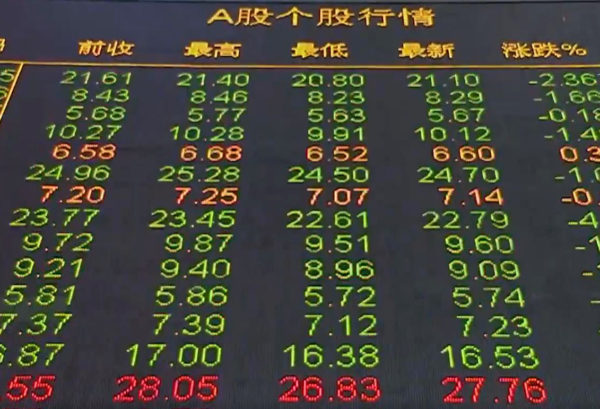◎ Investors appear to have preempted the move by regulators, leading to large-scale withdrawals of capital from the stock, bond, and futures markets.
The People’s Bank of China and other regulators overseeing banking, insurance, securities and foreign exchange issued a 10,000-character draft guideline on Nov. 17 with an eye on tightening supervision over Chinese asset management businesses.
Investors appear to have preempted the move by regulators, leading to large-scale withdrawals of capital from the stock, bond, and futures markets.
The backdrop:
- China’s asset management industry has progressed rapidly since the introduction of the first bank asset management product in 2004. By the end of 2016, the total outstanding volume of the industry was 102 trillion yuan (about $15.4 trillion), a value greater than China’s GDP for the year (about 74.4 trillion yuan or $11.2 trillion). Behind the scenes, however, the industry’s whirlwind-style expansion was accompanied by high-risk practices like regulatory arbitrage, “fund pools,” “rigid repayment” (fixed payments), etc.
- In addressing the “rigid repayment” issue, the new draft guideline ruled that investors must “undertake the investment risks and gains.”
- The draft guideline defines clear limits for the leverages that different types of funds can take. For instance, the guideline will curb the practice of investors raising funds to purchase asset management products or using existing products as leverage for financing. An example of such leveraging is Anbang Insurance Group using the sale of its insurance financial products to finance the acquisition of high-quality stocks in the capital market. Anbang then mortgages these stocks to the banks for capital to undertake more highly-leveraged buyouts. On Dec. 3, 2016, Top China securities regulator Liu Shiyu criticized Anbang and other insurers for being “stock market barbarians.”
- The draft guideline rule that financial institutions cannot develop or participate in fund pools that continuously rollover, is a collective trust, and has price isolating features. For instance, many peer-to-peer lending platforms during the 2015 boom were engaged in fund pools that resembled Ponzi schemes.
Our take:
- Xi Jinping is trying to mitigate risks in the financial sector by closing loopholes and imposing stringent guidelines so that his political rivals cannot abuse the system to undermine his rule. Based on our research, the Jiang Zemin faction engineered the 2015 China stock market crisis by exploiting financial loopholes.
- Xi is in the process of moving in on the Jiang faction members and Party princelings who sway China’s financial sector.
- Xi was able to more fully consolidate power at the 19th Party Congress after five years of purging political opponents via an anti-corruption campaign and installing his allies in key positions. With the personnel movements more or less settled, Xi can focus his attention on cleaning up the murky financial industry.
- There have been signs this year of stricter financial regulation:
- In mid-July, the five Chinese regulatory bodies discussed the issue of supervision and safeguarding against financial risks during a twice-a-decade financial work meeting.
- In his 19th Congress report, Xi spoke about the need to build a robust financial system and prevent the buildup of systemic risks.
- A vice premier was appointed head of the new Financial Stability and Development Committee on Nov. 8.
- Xi needs to resolve China’s many financial problems if he intends to stay in office. Currently, local government debt and high-risk banking loans are being layered and leveraged into various funds or financial products, and then sold off to individual investors. Also, while the financial sector has steller turnover and results, this doesn’t benefit the real economy and instead compounds systemic financial risks.












